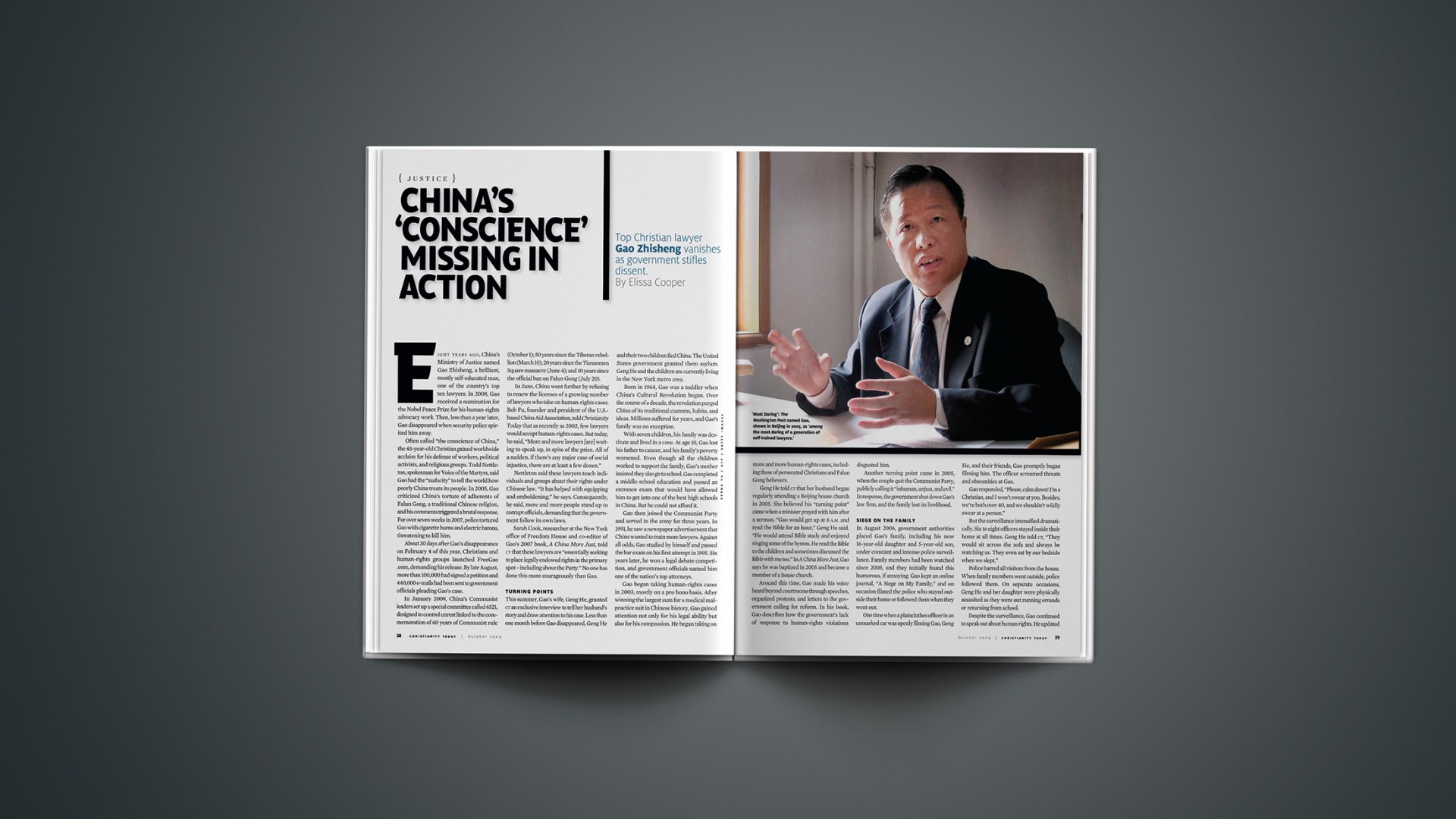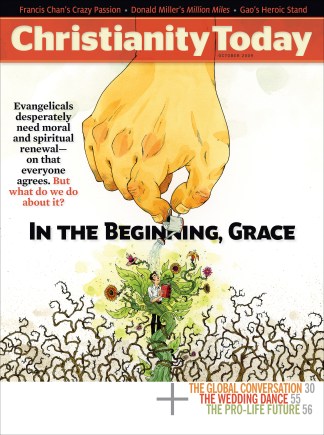Eight years ago, China’s Ministry of Justice named Gao Zhisheng, a brilliant, mostly self-educated man, one of the country’s top ten lawyers. In 2008, Gao received a nomination for the Nobel Peace Prize for his human-rights advocacy work. Then, less than a year later, Gao disappeared when security police spirited him away.
Often called “the conscience of China,” the 45-year-old Christian gained worldwide acclaim for his defense of workers, political activists, and religious groups. Todd Nettleton, spokesman for Voice of the Martyrs, said Gao had the “audacity” to tell the world how poorly China treats its people. In 2005, Gao criticized China’s torture of adherents of Falun Gong, a traditional Chinese religion, and his comments triggered a brutal response. For over seven weeks in 2007, police tortured Gao with cigarette burns and electric batons, threatening to kill him.
About 30 days after Gao’s disappearance on February 4 of this year, Christians and human-rights groups launched FreeGao.com, demanding his release. By late August, more than 100,000 had signed a petition and 440,000 e-mails had been sent to government officials pleading Gao’s case.
In January 2009, China’s Communist leaders set up a special committee called 6521, designed to control unrest linked to the commemoration of 60 years of Communist rule (October 1); 50 years since the Tibetan rebellion (March 10); 20 years since the Tiananmen Square massacre (June 4); and 10 years since the official ban on Falun Gong (July 20).
In June, China went further by refusing to renew the licenses of a growing number of lawyers who take on human-rights cases. Bob Fu, founder and president of the U.S.-based China Aid Association, told Christianity Today that as recently as 2002, few lawyers would accept human-rights cases. But today, he said, “More and more lawyers [are] waiting to speak up, in spite of the price. All of a sudden, if there’s any major case of social injustice, there are at least a few dozen.”
Nettleton said these lawyers teach individuals and groups about their rights under Chinese law. “It has helped with equipping and emboldening,” he says. Consequently, he said, more and more people stand up to corrupt officials, demanding that the government follow its own laws.
Sarah Cook, researcher at the New York office of Freedom House and co-editor of Gao’s 2007 book, A China More Just, told CT that these lawyers are “essentially seeking to place legally endowed rights in the primary spot—including above the Party.” No one has done this more courageously than Gao.
Turning Points
This summer, Gao’s wife, Geng He, granted CT an exclusive interview to tell her husband’s story and draw attention to his case. Less than one month before Gao disappeared, Geng He and their two children fled China. The United States government granted them asylum. Geng He and the children are currently living in the New York metro area.
Born in 1964, Gao was a toddler when China’s Cultural Revolution began. Over the course of a decade, the revolution purged China of its traditional customs, habits, and ideas. Millions suffered for years, and Gao’s family was no exception.
With seven children, his family was destitute and lived in a cave. At age 10, Gao lost his father to cancer, and his family’s poverty worsened. Even though all the children worked to support the family, Gao’s mother insisted they also go to school. Gao completed a middle-school education and passed an entrance exam that would have allowed him to get into one of the best high schools in China. But he could not afford it.
Gao then joined the Communist Party and served in the army for three years. In 1991, he saw a newspaper advertisement that China wanted to train more lawyers. Against all odds, Gao studied by himself and passed the bar exam on his first attempt in 1995. Six years later, he won a legal debate competition, and government officials named him one of the nation’s top attorneys.
Gao began taking human-rights cases in 2003, mostly on a pro bono basis. After winning the largest sum for a medical malpractice suit in Chinese history, Gao gained attention not only for his legal ability but also for his compassion. He began taking on more and more human-rights cases, including those of persecuted Christians and Falun Gong believers.
Geng He told CT that her husband began regularly attending a Beijing house church in 2005. She believed his “turning point” came when a minister prayed with him after a sermon. “Gao would get up at 6 a.m. and read the Bible for an hour,” Geng He said. “He would attend Bible study and enjoyed singing some of the hymns. He read the Bible to the children and sometimes discussed the Bible with me too.” In A China More Just, Gao says he was baptized in 2005 and became a member of a house church.
Around this time, Gao made his voice heard beyond courtrooms through speeches, organized protests, and letters to the government calling for reform. In his book, Gao describes how the government’s lack of response to human-rights violations disgusted him.
Another turning point came in 2005, when the couple quit the Communist Party, publicly calling it “inhuman, unjust, and evil.” In response, the government shut down Gao’s law firm, and the family lost its livelihood.
Siege on the Family
In August 2006, government authorities placed Gao’s family, including his now 16-year-old daughter and 5-year-old son, under constant and intense police surveillance. Family members had been watched since 2005, and they initially found this humorous, if annoying. Gao kept an online journal, “A Siege on My Family,” and on occasion filmed the police who stayed outside their home or followed them when they went out.
One time when a plainclothes officer in an unmarked car was openly filming Gao, Geng He, and their friends, Gao promptly began filming him. The officer screamed threats and obscenities at Gao.
Gao responded, “Please, calm down! I’m a Christian, and I won’t swear at you. Besides, we’re both over 40, and we shouldn’t wildly swear at a person.”
But the surveillance intensified dramatically. Six to eight officers stayed inside their home at all times. Geng He told CT, “They would sit across the sofa and always be watching us. They even sat by our bedside when we slept.”
Police barred all visitors from the house. When family members went outside, police followed them. On separate occasions, Geng He and her daughter were physically assaulted as they were out running errands or returning from school.
Despite the surveillance, Gao continued to speak out about human rights. He updated his journal daily. When the authorities took out the family’s phone line and shut off Internet access, Gao read his journal over a cell phone to others who would post it online.
In September 2007, Gao wrote a letter to the U.S. Congress. He listed the ways China had refused to honor its own human-rights laws and implored the U.S. to take action, such as boycotting the 2008 Beijing Olympics. He concluded his letter by stating,
“Jesus said, ‘Love others as well as you love yourself.’ Those struggling in the [Chinese Communist Party] prisons, those crying under the [Chinese Communist Party’s] tortures, those roaming around to avoid mistreatment need your help.
“May God bless America, may God give each person justice, responsibility, and firm determination, may the light of freedom shine upon China proper, let evil have no place to hide, and may the mistreated no longer be in pain.”
After the letter was released, China imprisoned Gao. Guards told him, “We can torture you to death without your body being found.” Gao was stripped and beaten with electric shock prods. Torturers urinated on his face and head, pierced his genitals with toothpicks, and blew cigarette smoke into his eyes until they were swollen shut. When Gao was able to open his eyes, he found his entire body bruised.
The torture stopped when Gao agreed to “confess” by writing an article declaring that the government treated his family well and that Falun Gong leaders had fooled him into writing the letter to Congress. Shortly after his release, Gao wrote a letter detailing his ordeal, even though one torturer repeatedly told him, “Your death is sure if you share this with the outside world.”
Gao authorized the letter to be released to the public on February 9, 2009.
Last September, Gao’s daughter had stopped going to school. Harassment from police and classmates had left her severely depressed. The whole family struggled with the constant surveillance. Finally, in January, Geng He and the children escaped to Thailand. After being granted asylum, they came to the U.S. in March. Geng He told CT that she and the children continue to adjust to their new lives. She says that while she is not a Christian, she is interested in learning more about the faith. Her daughter, although still out of school, happily attends church.
Late this spring, the campaign for Gao’s release finally produced a response from China. On May 18, Zhou Wenzhong, China’s ambassador to the U.S., presented a letter stating that Gao was under probation for a 2006 legal violation. But the government would not specify his location or well-being.
Small Steps, Right Direction?
In the short term, the best hope for improving human rights in China may rest on the world’s response to Gao’s detention. On July 10, the Congressional Executive Commission on China (CECC), a monitoring group, hosted “China’s Human Rights Lawyers: Current Challenges and Prospects” to draw fresh attention to human rights inside China.
Fu of China Aid brought the latest 50,000 petition signatures to the CECC roundtable discussion. He called on American diplomats to meet with persons in China fighting for human rights. Fu insisted that the Obama administration should do more for Gao and others. Paul Marshall, a senior fellow at the Hudson Institute, said in an e-mail to CT, “While the U.S. government always needs to be ‘diplomatic’ in dealing with China and others, the current administration has sent continued signals that China’s (and others’) human-rights acts will not affect U.S. attitudes and policies. Thus, we surrender any leverage.”
In e-mails to CT, Byron Dorgan, CECC’s chair and Democratic senator from North Dakota, defended the Obama administration. He claims that as the U.S. works on other issues with China, such as finances and the environment, people’s human rights will improve because the issues are connected.
U.S. political leaders have made other efforts to pressure China. On her trip to China in May, House Speaker Nancy Pelosi asked for the release of “prisoners of conscience,” including Gao. In July, members of Congress sent a letter to Ambassador Zhou regarding Gao.
These are small steps in the right direction. Marshall told CT, “We cannot change China’s policy ourselves, but we can let them know that there is a cost.”
In the meantime, Geng He continues to fight for the freedom of her husband and others. “My husband’s wish was that his children have freedom and human rights too, so now that we’ve arrived in the U.S., he can let out a sigh of relief.
“Without human rights, what else does a person have?”
Elissa Cooper is an editorial intern at Christianity Today. For updated information, visit FreeGao.com. Additional reporting provided by Amy Wu.
Copyright © 2009 Christianity Today. Click for reprint information.
Related Elsewhere:
Previous Christianity Today articles on China include:
China’s Human Rights, In the Red | President Obama should keep values at the center of American foreign policy. (March 13, 2009)
Smuggling Debate | Ministries disagree on how best to provide Bibles to Chinese Christians. (January 27, 2009)
Cover story: Great Leap Forward | China is changing and so is its church. How new urban believers are shaping society in untold ways. (May 9, 2008)










